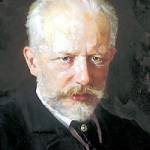I like this from Jeffrey Davis: “Creativity is not about waiting for the muse. Creativity is about showing up and shaping time for the muse.”[1] Reminds me of this exchange between a St. Petersburg journalist and Tchaikovsky about his work habits:

T: “Once I have settled in Petersburg, I shall continue to work, as before, from ten to one o’clock and from five to eight, and then spend the evening with friends.”
J: “You work six hours a day!”
T: “Without fail, every day.”
J: “But what if you don’t feel the desire or ability to work?”

T: “Then I force myself to feel that ability. Nowadays young people wait for inspiration before setting to work, but I consider this quite mistaken. Could Mozart, who died at such a young age, have written so many marvelous works if he had constantly been waiting around for inspiration?”[2]
Sources:
[1] Jeffrey Davis, 11 Riffs on Creativity & Time, October 15, 2012.
[2] Quoted in Alexander Poznansky’s Tchaikovsky Through Others’ Eyes (Indiana University Press, 1999), p. 209.
The portrait of Tchaikovsky was painted in 1893 by Nikolai Kuznetsov.
Related: On being the entrepreneur of your life: productiveness, perseverance, and getting stuff done:
Tchaikovsky’s remarks remind me of Edison’s “Genius is 1% inspiration and 99% perspiration.”
Hugo also had a regular schedule of work every day.
Hugo would order his servant to lock him naked in his room with orders not to let him out until twenty pages of prose or poetry had been slipped under the door. That was definitely inspired.
Work precedes not follows inspiration.
A successful painter friend related a story from his days at NYCs Art Student’s League. An instructor revealed the secret of becoming an artist: set up one’s easel, canvas, palette, paints, solvents and brushes. Then take a brush, dip it into paint and apply it to the canvas. That’s it. Or as the Nike folks say: just DO it.
I am not surprised that Ed Fox has beat me to the punch hereabouts. Michelangelo used to say, “They wouldn’t think I was a genius if they knew how many sketches I did before I began the sculpture.” Plus, he was an architect, poet, and painter! Dr. Johnson told Bozzy, “A man may write at any time by picking up pen and paper” [my paraphrase.] Or, you might resort to fondling silk fabric like Wagner, who said he could not compose without inspiration, yet, the Ring has over a million notes. One reason for the great outpouring of genius in the 19th century was the Victorian work ethic, a subject rarely pursued by this Hugh Hefner generation. One of the most brilliant men of my acquaintance, Dr. Eric Wollencott Barnes, used to begin his writing by literally re-writing some of what he’d done the day before. The brain needs almost to be cudgeled to produce its sparkling dew of thought. In his last years, Beethoven, the greatest improviser of his time, and capable of prodigious output, said “Only now have I learned to compose.” Yet, in the artistic vein, time spent in meditation is equally important. It is necessary to dream and fantasize. However, come the dawn and cold winds and hungry mouths, Moses quotes the Creator: “By the sweat of your brow you will earn your bread.” Period, full stop!
Bravo!